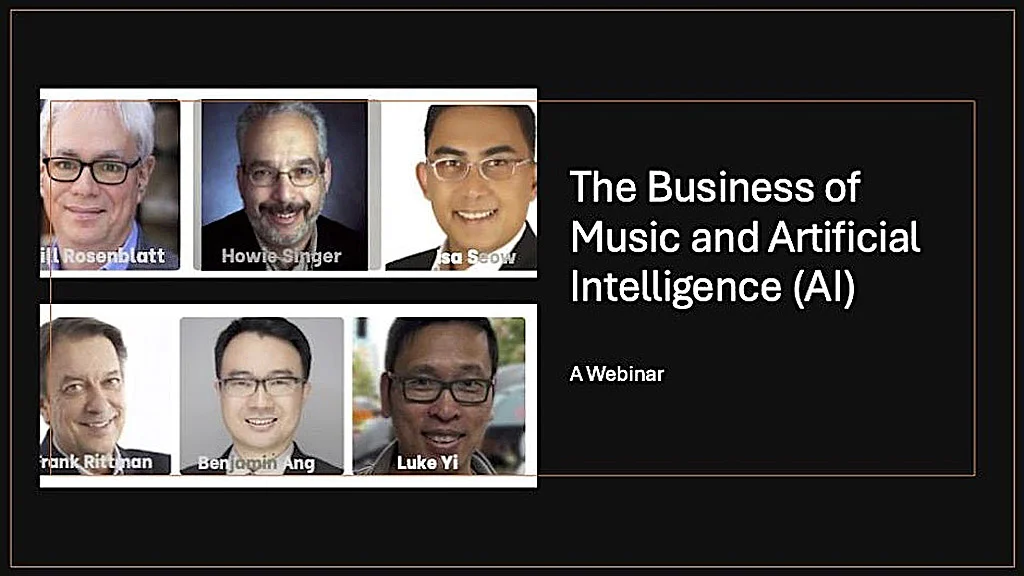
The Business of Music and Artificial Intelligence
Event Date: 3rd December 2024
Event Venue
Online
Event Website Link
Programme
New Zealand Time
1.00 – 1.10 PM: Welcome and Opening Remarks
• Host: Isa Seow, Asia Ventures Limited.
• Overview of the conference goals and schedule. • Introduction to the topics and speakers.
1.10 – 1.30 PM: Session 1 – Music and AI: Their Policy Impact
• Speaker: Bill Rosenblatt
• What is the issue? How does it impact musicians and policy? • Exploration of current challenges and future implications.
1.30 – 1.50 PM: Session 2 – Distribution and AI: The Interests of Labels, Distributors, and Agents • Speaker: Howie Singer
• Examination of AI’s role in music and distribution.
• Analysis of how labels, distributors, and agents are adapting to AI technologies.
1.50 – 2.10 PM: Session 3 – Copyright Implications and Monetisation
• Speaker: Frank Rittman
• Discussion on how AI is affecting copyright laws and royalty associations. • Analysis of the regulatory landscape and future policy directions.
2.10 – 2.20 PM: short break – get your coffees!
2.20 – 2.40 PM: Session 4 – AI and Security • Speaker: Benjamin Ang
• Fake music? Fake artists?
• Exploring AI’s impact in Asia Pacific
2.40 – 3.00 PM: Brief Session 5 – Impact on Creativity and Originality
• Speakers: Luke Yi, Isa Seow, others
• Insights from musicians on their experiences with AI in music creation. • Discussion on the benefits and concerns from a musician’s perspective.
3.00 – 4 PM Panel discussion and Q&A Discuss the next steps
Event Summary
The intersection of AI and music is a focal point in the ongoing battle between copyright owners and technologists. At the heart of this struggle lies the tension between free access to data, which has driven AI’s rapid development, and the protection of intellectual property, fiercely guarded by copyright holders.
Companies like Google have set a significant precedent by acquiring vast amounts of data without direct cost, enabling swift advancements in AI technologies. This approach has been pivotal in developing sophisticated AI systems capable of generating music, analysing trends, and even predicting hits. However, this model has sparked intense debates about the ethics and legality of using copyrighted material without compensation to creators.
On the other side of the spectrum, copyright owners, particularly those with a digital approach, argue that their content is inherently protected and should not be used without proper licensing and remuneration. This perspective underscores a fundamental conflict: while AI technologies thrive on access to large datasets, copyright holders seek to maintain control over their intellectual property to safeguard their revenue streams.
The landscape is further complicated by the varied responses of major media entities. Some, like The Atlantic, have struck deals with companies like OpenAI, recognising the potential benefits of collaboration. These agreements often involve licensing content for AI training in exchange for compensation or other benefits. Conversely, others, like The New York Times, staunchly resist AI’s encroachment on their intellectual property, highlighting the lack of consensus on how to navigate these new technological realities.
The debate often oversimplifies the myriad interests involved, overlooking the distinct positions of creators, distributors, and technologists. In the music industry, in particular, current business models appear skewed against creators, who often have the least influence in these discussions. Record labels and streaming platforms, which act as intermediaries, tend to capture a significant portion of the revenue, leaving creators with relatively meagre earnings. This imbalance raises critical moral, legal, and technological challenges.
The future economics of the music industry, driven by AI, might not align with the best interests of human creators. As AI-generated music becomes more prevalent, there is a risk that the unique value of human creativity and artistic freedom could be undermined. The ease with which AI can produce music could flood the market, potentially devaluing human-made compositions and reducing opportunities for artists to make a living from their craft.
The music industry, with its unique ecosystem of creators, producers, and distributors, necessitates specific regulations and business models that fairly compensate all stakeholders. This might involve new licensing frameworks, revenue-sharing models, or even AI-generated music levies to support human creators.
As AI continues to evolve, the prospect of computer sentience adds another layer of complexity. If AI systems were to achieve a level of awareness or creativity akin to humans, the notion of AI recognising and adhering to copyright could emerge. This raises profound questions about the nature of creativity, ownership, and the rights of sentient machines, potentially redefining the legal and ethical boundaries of copyright.